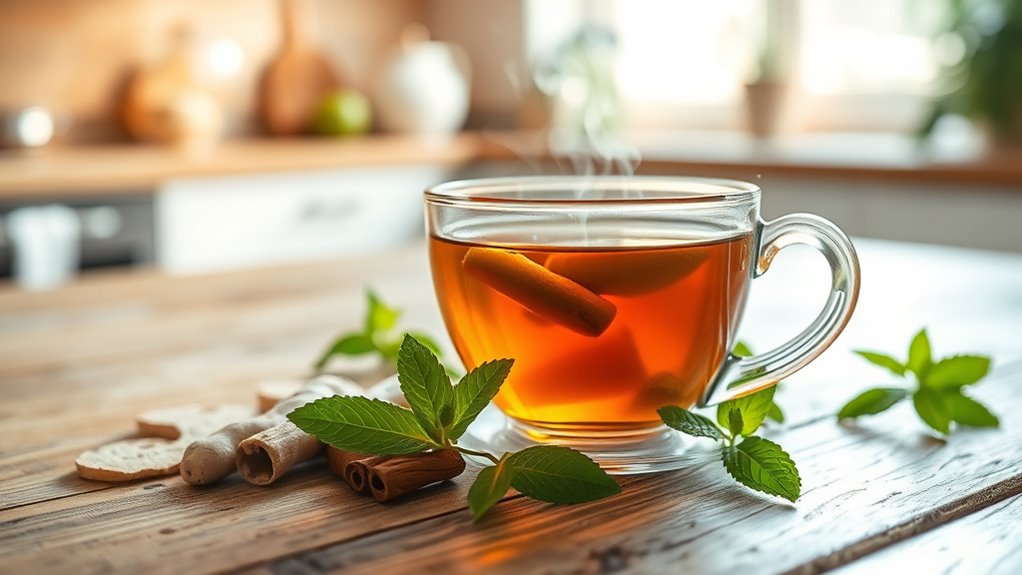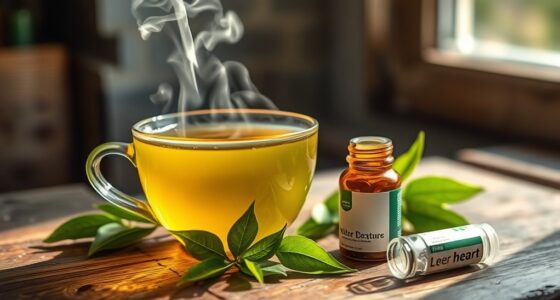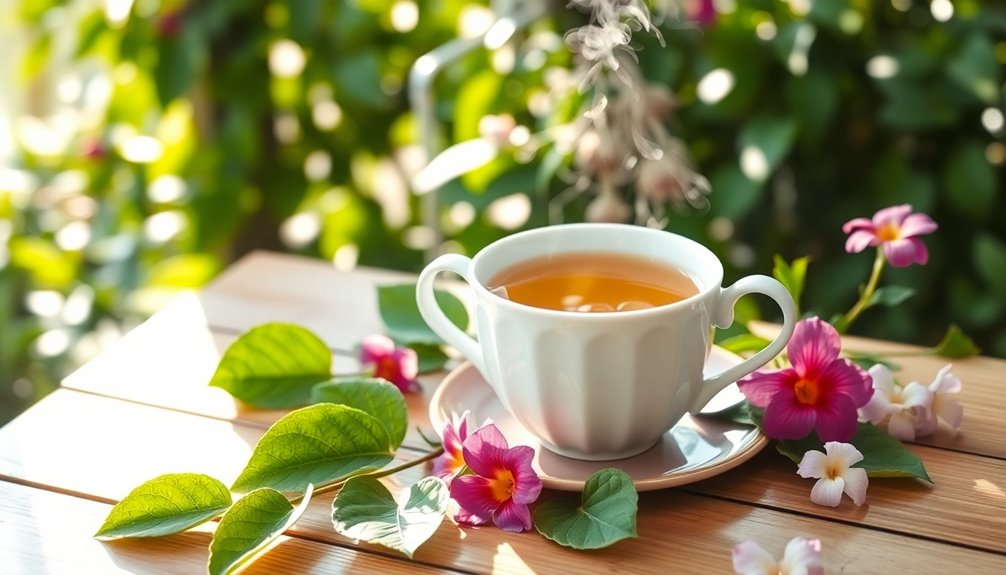For heart health, consider drinking herbal infusions like hawthorn and hibiscus, as they are caffeine-free and support circulation and blood pressure. Green and black teas offer antioxidants and moderate caffeine that can also boost cardiovascular wellness. Combining these options in your daily routine helps reduce inflammation and improve blood vessel function. Keep exploring to discover more tips on choosing the best teas to suit your heart health goals and how to incorporate them successfully.
Key Takeaways
- Herbal infusions like hawthorn and hibiscus are caffeine-free options that support blood pressure and circulation.
- Green and black teas contain antioxidants and moderate caffeine that may benefit heart health when consumed responsibly.
- Hibiscus tea helps lower blood pressure due to its high antioxidant content.
- Hawthorn tea enhances blood flow and strengthens heart muscle function.
- Combining herbal infusions with traditional teas can provide comprehensive cardiovascular benefits.

Ever wonder how a simple cup of tea can boost your heart health? It turns out, the type of tea you choose can make a real difference. Herbal infusions, for example, are popular options for those looking to support their cardiovascular system. Unlike traditional teas made from Camellia sinensis, herbal infusions are crafted from various herbs, flowers, and fruits, and they typically contain no caffeine. This makes them a great choice if you’re sensitive to caffeine or prefer to avoid it in the evening. Many herbal infusions, such as hawthorn or hibiscus, are known for their heart-friendly benefits. Hawthorn, in particular, has been used for centuries to improve circulation and strengthen heart function. Hibiscus tea is rich in antioxidants and has been shown to help lower blood pressure, which is a critical factor in maintaining heart health.
Herbal infusions like hawthorn and hibiscus support heart health without caffeine.
Speaking of caffeine, you might wonder how it factors into choosing the best teas for your heart. While black and green teas contain caffeine, their levels are generally moderate compared to coffee, and they also provide powerful antioxidants like catechins and flavonoids. These compounds help reduce inflammation and improve blood vessel function, supporting overall cardiovascular health. If you’re trying to limit your caffeine intake, herbal infusions are an excellent alternative—they’re naturally caffeine-free and still packed with beneficial plant compounds. On the other hand, moderate caffeine consumption from black or green teas can be beneficial, as long as it doesn’t interfere with your sleep or cause jitteriness.
Choosing the right tea depends on your personal health goals and preferences. For example, if you’re aiming to lower blood pressure, hibiscus tea can be an effective choice due to its natural diuretic properties and ability to relax blood vessels. If you’re interested in improving blood flow and heart muscle strength, hawthorn tea might be more suitable. Both herbal infusions and traditional teas offer antioxidants that combat oxidative stress, a key factor in heart disease. Plus, they’re easy to incorporate into your daily routine—simply swap your usual beverage for a cup of herbal or green tea in the morning or afternoon.
Ultimately, the best teas for heart health combine the right herbal infusions with mindful caffeine intake. Whether you prefer a caffeine-free herbal blend or a lightly caffeinated green or black tea, making these drinks part of your daily habits can support your cardiovascular wellness. Just remember to enjoy them without added sugars or sweeteners, which can negate their benefits. With consistency, these teas can become a simple yet powerful part of your heart-healthy lifestyle.
Frequently Asked Questions
Can Tea Help Prevent Heart Disease?
Yes, tea can help prevent heart disease. The antioxidants in tea, like catechins and flavonoids, actively combat oxidative stress and inflammation, which are key factors in heart disease development. Drinking tea regularly supports heart health by improving blood flow and reducing bad cholesterol levels. So, incorporating tea into your daily routine can be a simple, enjoyable way to contribute to heart disease prevention and overall cardiovascular wellness.
Which Tea Has the Highest Antioxidant Content?
Like Pandora’s box, some tea varieties boast surprising antioxidant levels. Among them, matcha green tea stands out, packing the highest antioxidant content due to its powdered form, giving you a concentrated dose. This means you’ll get more polyphenols and catechins, which fight free radicals. If you’re after the most potent antioxidant punch, switch to matcha, and enjoy the health benefits while savoring its rich, earthy flavor.
Are Herbal Teas Beneficial for Heart Health?
Herbal teas, or herbal infusions, can be beneficial for your heart health as natural remedies. Many herbs like hawthorn, hibiscus, and ginger are known to support cardiovascular health by reducing blood pressure, lowering cholesterol, and improving circulation. Incorporating these herbal infusions into your daily routine offers a natural way to promote heart wellness. Just remember to consult with a healthcare professional before making significant changes, especially if you take medications.
How Much Tea Should I Drink Daily for Heart Benefits?
You should aim for about 2 to 3 cups of tea daily for heart benefits. The recommended servings vary depending on the type of tea and your health, but generally, this amount provides enough antioxidants and polyphenols to support cardiovascular health. Make sure not to exceed 4 cups a day, as too much caffeine or certain compounds could have adverse effects. Stick to moderate daily intake for ideal heart health benefits.
Are There Any Side Effects of Drinking Heart-Healthy Teas?
You might experience some side effects from heart-healthy teas, especially if you have allergies or sensitive reactions. Tea interactions with medications can cause issues, so check with your doctor if you’re on blood thinners or other drugs. Allergy concerns are also important; if you’re allergic to certain plants like chamomile or hibiscus, avoid those teas. Moderation helps minimize side effects, ensuring you enjoy the benefits safely.
Conclusion
Choosing the right tea can be like planting seeds for a healthier heart. Just as one sip of green tea might remind you of a invigorating breeze, consistent consumption can gradually strengthen your cardiovascular health. Imagine each cup as a small, nurturing act—like tending to a garden that blooms over time. By making mindful choices today, you’re watering the roots of your well-being, ensuring your heart stays resilient and vibrant for years to come.










